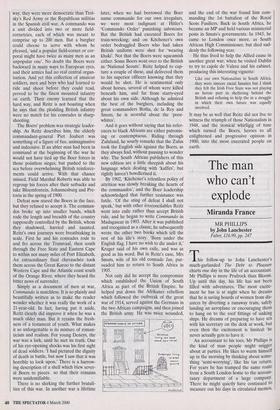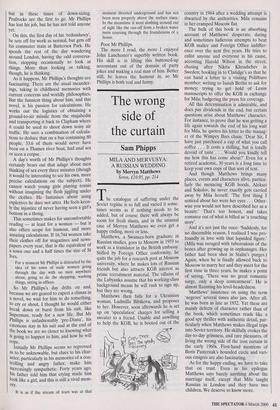The man
who can't explode
Miranda France
MR PHILLIPS by John. Lanchester Faber, £16.99, pp. 247 This follow-up to John Lanchester's much-garlanded The Debt to Pleasure charts one day in the life of an accountant. Mr Phillips is more Prufrock than Bloom. Up until this day, his life has not been filled with adventures. The most excite- ment he has is at night when he dreams that he is saving hoards of women from dis- asters by diverting a runaway train, safely landing an aeroplane or encouraging them to hang on to the roof fittings of sinking ships. He dreams of preparing to have sex with his secretary on the desk at work, but even then the excitement is limited: he never actually gets to have it, An accountant to his toes, Mr Phillips is the kind of man people might snigger about at parties. He likes to warm himself up in the morning by thinking about some- thing 'semi-worrying', like his tax return. For years he has tramped the same route from a South London home to the accoun- tancy department of a large company. There he might quietly have continued to measure out his days in circulated memos, but in these times of down-sizing, Prufrocks are the first to go. Mr Phillips has lost his job, but he has not told anyone yet.
On this, the first day of his 'redundancy', he sets off for work as normal, but gets off his commuter train at Battersea Park. He spends the rest of the day wandering around London, having the odd conversa- tion, stopping occasionally to look at things. More than looking or talking, though, he is thinking. As it happens, Mr Phillips's thoughts are fascinating. There are the usual meander- ings, taking in childhood memories with current concerns and worldly philosophies. But the funniest thing about him, and this novel, is his passion for calculations. He works out the logistics of obtaining a ground-to-air missile from the mujahedin and transporting it back to Clapham where it could be used to shoot down noisy air traffic. He uses a combination of calcula- tions to deduce that on a bus containing 80 people, 33.6 of them would never have been on a Thames river boat, had anal sex or seen a corpse. A day's worth of Mr Phillips's thoughts certainly bears out that adage about men thinking of sex every three minutes (though it would be interesting to see his own, more precise calculations on the subject). He cannot watch young girls playing tennis without imagining the flesh jiggling under the clothes. He fantasises about using expletives he dare not utter. He feels keen- ly the injustice of never having seen a girl's bottom in a thong. This sometimes makes for uncomfortable reading — at least for a woman — but it also offers scope for humour, and more amazing calculations. If 16,744 women take their clothes off for magazines and news- papers every year, that is the equivalent of a town one and a half times the size of St Ives.
For a moment Mr Phillips is distracted by the idea of his town of nude women going through the day with no men anywhere about, going to do the shopping, washing things, sitting in offices.
So Mr Phillips's day drifts on and, because we are geared to expect a climax in a novel, we wait for him to do something, to cry or shout. I thought he would either break down or burst from his suit, like Superman, ready for a new life. But Mr Phillips is unfashionably 'pre-Diana', his emotions stay in his suit and at the end of the book we are no closer to knowing what is going to happen to him, and how he will cope. Initially Mr Phillips seems so repressed as to be unknowable, but clues to his char- acter, particularly in his memories of a con- trolling and angry father, make him increasingly sympathetic. Forty years ago, his father told him that crying made him look like a girl, and this is still a vivid mem- ory.
It is as if the stream of tears was at that
moment diverted underground and has not been seen properly above the surface since. In the meantime it went sloshing around out of sight like the run-off from a broken water main coursing through the foundations of a house.
Poor Mr Phillips.
The more I read, the more I enjoyed John Lanchester's superbly written book. His skill is in lifting this buttoned-up accountant out of the domain of party jokes and making a real man of him. Better still, he leaves the humour in, so Mr Phillips is both real and funny.



































































 Previous page
Previous page